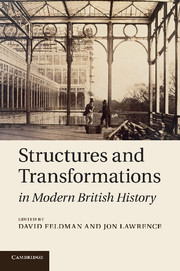Book contents
- Frontmatter
- Contents
- List of figures
- Notes on contributors
- Introduction: structures and transformations in British historiography
- 1 Coping with rapid population growth: how England fared in the century preceding the Great Exhibition of 1851
- 2 The ‘urban renaissance’ and the mob: rethinking civic improvement over the long eighteenth century
- 3 Forms of ‘government growth’, 1780–1830
- 4 Family formations: Anglo India and the familial proto-state
- 5 The commons, enclosure and radical histories
- 6 Engels and the city: the philosophy and practice of urban hypocrisy
- 7 The decline of institutional reform in nineteenth-century Britain
- 8 British women and cultures of internationalism, c.1815–1914
- 9 Psychoanalysis, history and national culture
- 10 Labour and the politics of class, 1900–1940
- 11 The dialectics of liberation: the old left, the new left and the counter-culture
- 12 Why the English like turbans: multicultural politics in British history
- Index
Introduction: structures and transformations in British historiography
Published online by Cambridge University Press: 04 February 2011
- Frontmatter
- Contents
- List of figures
- Notes on contributors
- Introduction: structures and transformations in British historiography
- 1 Coping with rapid population growth: how England fared in the century preceding the Great Exhibition of 1851
- 2 The ‘urban renaissance’ and the mob: rethinking civic improvement over the long eighteenth century
- 3 Forms of ‘government growth’, 1780–1830
- 4 Family formations: Anglo India and the familial proto-state
- 5 The commons, enclosure and radical histories
- 6 Engels and the city: the philosophy and practice of urban hypocrisy
- 7 The decline of institutional reform in nineteenth-century Britain
- 8 British women and cultures of internationalism, c.1815–1914
- 9 Psychoanalysis, history and national culture
- 10 Labour and the politics of class, 1900–1940
- 11 The dialectics of liberation: the old left, the new left and the counter-culture
- 12 Why the English like turbans: multicultural politics in British history
- Index
Summary
The travails of social history
‘Social history is at present in fashion’, Eric Hobsbawm observed in 1971, when the popularity of the subject was also becoming allied to grand intellectual ambitions. This was reflected five years later with the arrival of a new journal: Social History. In the first issue its editors announced confidently, and with a certain degree of belligerence, that social history was ‘not a new branch of historical scholarship’ but rather ‘a new kind of history’ whose mission was ‘to make incursions into all fields of historical analysis’. Social history was to transform historical practice by generating a new, more holistic understanding of past societies – a ‘total’ history. The same editorial recognised the significance of precursors such as the Annales School in France and British Marxist historiography, but declared, ‘social history has no orthodox repertoire, no dominant central “core” around which revolve a score of minor interests and enthusiasms’. Not even class. And this despite the fact that the journal rapidly became known for publishing a series of important interventions that dealt centrally with class formation, class-consciousness and class struggle in eighteenth- and nineteenth-century Britain.
Despite its centrality to the debates of the 1980s and early 1990s that would signal the retreat of social history as a ‘totalising’ project, in the 1960s, and for much of the 1970s, class occupied a contested place in modern British social history. It was present only unevenly. It did figure, for example, in histories of social movements and popular politics.
- Type
- Chapter
- Information
- Publisher: Cambridge University PressPrint publication year: 2011
- 2
- Cited by

